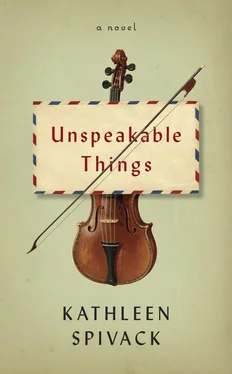At the end of the summer, the Rat was disconsolate. Her eyes were magnified with the tears that fell, unwiped, on the chessboard between them. She was more hunched than ever. They took a last walk together, their intensity augmented to the point where neither of them could stand it. “Let me,” whispered Herbert softly. “Let me touch you just one time.” Anna squeezed his hand. Gently, Herbert pulled back her collar and exposed the top of her spine. “I just want to look at you,” he murmured. Anna held his other hand all the while, squeezing tightly as she trembled, her body pressed in upon itself. He let his mouth graze her queerly shaped body. Neither of them said a word; this was to be their secret. When Herbert had finished letting his lips travel the length of her deformity, Anna swooned. She would have permitted him everything, but he caught himself.
He rearranged the shawl about her shoulders, helped her straighten her dress. She was still trembling. “Come,” said Herbert. He was overcome with the emotion of the situation; he wanted her, would always want her in a desperate way. “We will write each other during the year. And we will see each other next summer.” The Rat lifted her head, her eyes shining. “Yes,” said Herbert. “And we will correspond in different languages, we will write our thoughts and feelings and what we are reading, and we will continue our chess. Yes!” he continued, inspired by his own brilliance, and by the happy compliance of this Hungarian girl. “And next summer, we shall pick up again. For this must only be au revoir, not good-bye.” He put his hand on her little paw, and her trembling stopped. She brushed a tear from her whiskers.
“Oh, Herbert, what will happen to me?”
During the school year, they continued their separate lives, he in Vienna, she in Budapest. Their friendship grew through correspondence. Anna shared his passion for literature and language. Ever since that first summer, while they had continued to correspond during their absences from each other, Herbert thought about her incessantly: her deformity, her eyes. Yet on the surface he was getting to know other young ladies. It was as if Anna existed in a secret compartment, a delight to be pulled out and played with only during the summers. Their meetings each summer holiday were filled with joy. Always she approached him with shining eyes that drew him toward her secret. He loved to caress her hump. More was forbidden, and when he tried more, she tightened her legs and shook her head. Then the next minute she was welcoming him, and it was Herbert who had to draw the line. He did not know if he hated or loved her; he was fascinated, and yet there was something forbidden in the skirts of her dresses, something that he both sought and shunned. “Let me look at you,” he said. “I just want to look.”
Herbert, of course, was to make a proper marriage, a proper Christian marriage, as was appropriate to his career in the Austrian government. His mother had found him Adeline, and Herbert fell dutifully, romantically in love with the beautiful pianist.
The Rat was unable to attend the wedding. Anna, the emblem of his youth, was far away at that point. Her family had achieved the unimaginable. They had managed to buy for Anna and themselves a Russian count. A penniless Russian count, but a count nevertheless. The terms of this marriage were, among others, that the Rat was to leave immediately for Saint Petersburg, taking her fortune with her.
“And so, dearest cousin,” the Rat wrote, “what choice do I have? They do not explain to us the need for such a rush. But I am only a lady Rat after all, and so I go to meet my husband happily.”
Now, so many years later, in this suburb of war-torn Europe named New York, the Rat’s letters began to reach Herbert again. “Our last game, do you remember?” she wrote. “I was so stupid not to cover my bishop. I lost the whole game on that. Well, now we begin again.” Herbert smiled at her resolute handwriting and decisive approach. “I shall go first, my friend. Do not think you can so easily win now. I have been studying, yes, studying chess. And other things as well!” And then, as if there had been no break ever in their correspondence, Anna, choosing the first black pawn, opened the game again.
Of the intervening years, she wrote not one word. And Herbert, hardly knowing where to begin on his and Adeline’s life and experiences, also wrote not one personal word in response, except to mention that he was living now in New York with David and Ilse and their dear children. Herbert had decided that it was no use writing anything too personal, especially as he was now writing to a poste restante in Leningrad rather than to a real address. Who knew who might be reading, in fact, might even be writing, these letters concerning chess?
“And so, my dear lady, we will write of books. Literature. Yes, the literature we are reading and what is new and what is happening and what we both think about it,” Herbert decreed. “I have just discovered a new Italian writer,” he appended hastily to one letter to Anna, in which he had successfully avoided a threat to his last remaining knight. “His name is Leopardi. Do you know him?” Herbert then proceeded into a quick discussion of Leopardi. “Perhaps I shall find a copy and send it to you,” he suggested at the end of the postscript, knowing it was a futilely generous suggestion.
Anna’s response came six months later. “Leopardi, no, I have not heard of him. But then, I do not hear of many writers here….” The words were faint and wistful. “Now, dearest Herbert, watch out for my bishop,” she wrote more insistently.
Try as he might through his many connections, Herbert could not locate the actual whereabouts of the Rat. Perhaps she was a spy. Always the letters bore the return address of the central post office. He was careful to write very little of importance in his letters — not even in invisible ink.
At first, it had been a surprise when her notes had started to come to him in New York. He had been waiting in the Public Library for a meeting with a member of a committee for refugees, when a shabby man had jostled him. “I beg your pardon, Herr Doktor,” the man had muttered, showing bad teeth. “But I believe this is for you.” He had shoved the small envelope into Herbert’s hand, and then, just as furtively, disappeared somewhere into the stacks again.
“Who is that man?” Herbert later asked some of his committee members. But no one, of course, knew. “Who are you?” Herbert demanded the second time this happened.
“A friend,” replied the man. He looked at Herbert, shook his head once in warning, and disappeared again.
From then on, Herbert never asked. “Thank you, my friend,” was all he said, receiving these infrequent letters. Herbert smoothed out the crumpled paper and tried to figure out why, after all these years, Anna had decided to play chess again.
At night, Herbert held Anna’s letters up to a candle to decipher if there were an invisible message beneath her spidery inked scrawl of numbers and letters. But there was none, just the chess game, the continuation of their adolescent passion shared.
There was very little else in the Rat’s letters. The Rat had always included paragraphs in numerous languages, not forgetting Esperanto. The correspondence between Herbert and Anna had always included at least one passage in Esperanto. It had been Herbert’s idea, one summer vacation together, that all the cousins should learn Esperanto. He assured the others that a universal language, in this case Esperanto, would eventually transform mankind’s ability to communicate and thereby bring about world peace. Herbert and his brother, as well as the Rat and the Rat’s sister, seized upon this idea enthusiastically, and for a while Esperanto became their private communication, especially during mealtimes with the families.
Читать дальше












